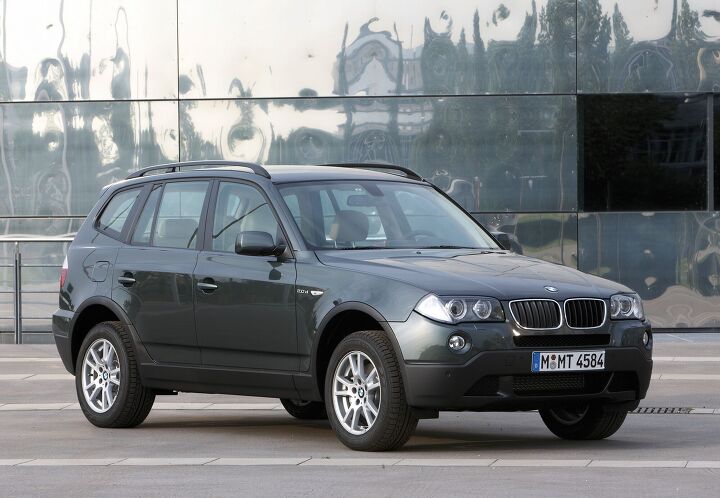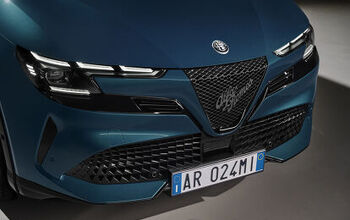BMW Accused of Emissions Cheating, Does Anyone Really Care?

Regulators in Germany have opened an investigation into alleged diesel exhaust rule circumvention on the part of BMW. Claims have been made that the automaker used an illegal defeat device on select models to achieve lower tailpipe emissions during testing. It’s a situation reminiscent of the Volkswagen Dieselgate scandal from 2015. However, government regulators have been on the offensive ever since — roping in loads of manufacturers and leaving a subset of the public wondering whether modern emission laws are even tenable.
The Kraftfahrt-Bundesamt (KBA), Germany’s federal transport authority, has alleged that BMW X3 models equipped with the brand’s 2.0-liter diesel motor contain software designed to skirt emission regulations. According to German outlet Bild, the issue stems from a difference in emissions based upon the status of the HVAC system.
Regulators are concerned that software may have been designed to intentionally emit less nitrogen oxides when the air-conditioning system is switched off. This reportedly matters because federal testing usually remains deactivated, leading to suspicion that BMW used this as a window to skirt regulations. But that seems like an oversimplification of the situation.
Due to the improved aerodynamics associated with driving with the windows up, combustion vehicles typically see improved fuel economy at highway speeds while running the air conditioner. This should also translate to lower emissions over time. However, the inverse is true at low speeds or idle because of the extra strain added by the compressor. It’s not unusual to see reduced carbon dioxide emissions when a vehicle isn’t running the A/C.
The investigation follows an earlier report issued by German environmental group Deutsche Umwelt Hilfe (DUH), which stated the BMW X3 2.0d possessed an illegal defeat device that allowed vehicles to pollute more under certain conditions. Accusations were thrown that BMW’s diesel motor saw a larger drop in emissions when the vehicle’s A/C was switched off than usual, suggesting that it could be the result of software malfeasance — comparing it to what happened with Volkswagen’s diesel vehicles years earlier.
“It is shocking that even more than seven years after the diesel scandal became known, we are detecting the highest nitrogen oxide emissions we have measured to date in diesel vehicles in real driving conditions and are finding shutdown devices in the engine control software,” DUH’s Federal Managing Director Jürgen Resch stated in German.
However, things aren’t that simple. Jürgen has been a professional environmental lobbyist since the 1980s and Deutsche Umwelt Hilfe has taken major criticisms for endorsing driving bans, carbon credits, and targeting stringent emissions laws at the expense of what’s reasonably achievable. Jürgen himself has likewise been faulted as one of the many high-profile climate activists that have utilized private jets. There’s also a lot of political tension due to how the DUH is organized — especially in regard to its ties to the government, despite claiming status as an NGO.
The organization receives funding from the American ClimateWorks Foundation, the European Commission and the German federal government as part of an EU-wide campaign to reduce pollution. It has similarly taken heat for campaigning for the advancement of diesel particulate filters in 2005 after accepting donations from the very same companies that manufacture them. It even went out of its way to endorse specific brands, calling into question how objective it truly was as an influential environmental watchdog.
DUH has likewise received funding from automakers and occasionally partnered with companies on certain programs. While several have cut ties in more recent years (e.g. Daimler and Toyota), the organization continues to receives criticism for claiming to be a non-profit.
Still, the above doesn’t automatically mean the group hasn’t uncovered emissions cheating on the part of BMW. Its investigation into Volkswagen Group helped uncover software manipulation that had the vehicle’s running lean spending on wheel positioning (indicating that it was operating on a test rig). So there’s reason to believe it might have uncovered similar shenanigans here.
But it also played a role in killing demand for affordable diesel vehicles in both Europe and the United States. No matter how you slice it, Deutsche Umwelt Hilfe seems hellbent on ending diesel-based transportation and it’s difficult to overstate just how much influence it has over German regulators and the industry at large.
While BMW won’t say much about the current investigation, it did end 2023 stating it’s in contact with European authorities to clarify questions made about emissions following concerns about a specific BMW model produced between 2010 and 2014. Odds are good it was talking about the X3 with the 2.0-liter diesel.
BMW CEO Harald Krueger also previously said that the company had not manipulated any diesel engines following the initial allegations — perhaps hinting at its stance should any formal charges be pressed.
But your author is wondering whether or not anyone even cares at this point. Volkswagen was fined billions of dollars and the United States forced it into establishing a subsidiary to improve the national EV charging infrastructure. The company is known as Electrify America and it has consistently been the worst-ranked charging network in the country. VW has also struggled to effectively launch EVs as it pivoted toward electrification, despite remaining broadly profitable.
For all the effort put into emissions regulations, they arguably haven’t resulted in better automobiles. Consumer satisfaction surveys have been trending downward while prices continue to climb. Meanwhile, regulatory efforts seem focused on determining what type of vehicle you’ll be allowed to drive in the future and using regulatory fines to further shape the industry by pouring the money back into businesses that are ideologically aligned with the relevant NGOs.
Similar arguments can certainly be made about the oil industry. But it also appears to have bought into using environmentalism as a shield. Its lobbying efforts are also a little more blatant and the entities shilling for it don’t appear to have the government’s ear like they used to. The real issue is likely not which group is trying to influence policy but rather the fact that it’s happening on a corporate and/or political level. At the end of the day, too much of this just feels like a colossal waste of time and money without any noteworthy advantages trickling down to the consumer.
[Image: BMW]
Become a TTAC insider. Get the latest news, features, TTAC takes, and everything else that gets to the truth about cars first by subscribing to our newsletter.

A staunch consumer advocate tracking industry trends and regulation. Before joining TTAC, Matt spent a decade working for marketing and research firms based in NYC. Clients included several of the world’s largest automakers, global tire brands, and aftermarket part suppliers. Dissatisfied with the corporate world and resentful of having to wear suits everyday, he pivoted to writing about cars. Since then, that man has become an ardent supporter of the right-to-repair movement, been interviewed on the auto industry by national radio broadcasts, driven more rental cars than anyone ever should, participated in amateur rallying events, and received the requisite minimum training as sanctioned by the SCCA. Handy with a wrench, Matt grew up surrounded by Detroit auto workers and managed to get a pizza delivery job before he was legally eligible. He later found himself driving box trucks through Manhattan, guaranteeing future sympathy for actual truckers. He continues to conduct research pertaining to the automotive sector as an independent contractor and has since moved back to his native Michigan, closer to where the cars are born. A contrarian, Matt claims to prefer understeer — stating that front and all-wheel drive vehicles cater best to his driving style.
More by Matt Posky
Latest Car Reviews
Read moreLatest Product Reviews
Read moreRecent Comments
- Alan Years ago Jack Baruth held a "competition" for a piece from the B&B on the oddest pickup story (or something like that). I think 5 people were awarded the prizes.I never received mine, something about being in Australia. If TTAC is global how do you offer prizes to those overseas or are we omitted on the sly from competing?In the end I lost significant respect for Baruth.
- Alan My view is there are good vehicles from most manufacturers that are worth looking at second hand.I can tell you I don't recommend anything from the Chrysler/Jeep/Fiat/etc gene pool. Toyotas are overly expensive second hand for what they offer, but they seem to be reliable enough.I have a friend who swears by secondhand Subarus and so far he seems to not have had too many issue.As Lou stated many utes, pickups and real SUVs (4x4) seem quite good.
- 28-Cars-Later So is there some kind of undiagnosed disease where every rando thinks their POS is actually valuable?83K miles Ok.new valve cover gasket.Eh, it happens with age. spark plugsOkay, we probably had to be kewl and put in aftermarket iridium plugs, because EVO.new catalytic converterUh, yeah that's bad at 80Kish. Auto tranny failing. From the ad: the SST fails in one of the following ways:Clutch slip has turned into; multiple codes being thrown, shifting a gear or 2 in manual mode (2-3 or 2-4), and limp mode.Codes include: P2733 P2809 P183D P1871Ok that's really bad. So between this and the cat it suggests to me someone jacked up the car real good hooning it, because EVO, and since its not a Toyota it doesn't respond well to hard abuse over time.$20,000, what? Pesos? Zimbabwe Dollars?Try $2,000 USD pal. You're fracked dude, park it in da hood and leave the keys in it.BONUS: Comment in the ad: GLWS but I highly doubt you get any action on this car what so ever at that price with the SST on its way out. That trans can be $10k + to repair.
- 28-Cars-Later Actually Honda seems to have a brilliant mid to long term strategy which I can sum up in one word: tariffs.-BEV sales wane in the US, however they will sell in Europe (and sales will probably increase in Canada depending on how their government proceeds). -The EU Politburo and Canada concluded a trade treaty in 2017, and as of 2024 99% of all tariffs have been eliminated.-Trump in 2018 threatened a 25% tariff on European imported cars in the US and such rhetoric would likely come again should there be an actual election. -By building in Canada, product can still be sold in the US tariff free though USMCA/NAFTA II but it should allow Honda tariff free access to European markets.-However if the product were built in Marysville it could end up subject to tit-for-tat tariff depending on which junta is running the US in 2025. -Profitability on BEV has already been a variable to put it mildly, but to take on a 25% tariff to all of your product effectively shuts you out of that market.
- Lou_BC Actuality a very reasonable question.


































Comments
Join the conversation
I totally care. So there!
The new on-the-road tests mandated by the EU do result in noteworthy advantages in nitrogen emissions.
This is how automakers tied themselves up in a knot: they cheated in emissions before, which led to more stringent regulation by lawmakers after air quality in cities failed to improve, and now automakers have to actually hit those more stringent targets in real-world conditions.